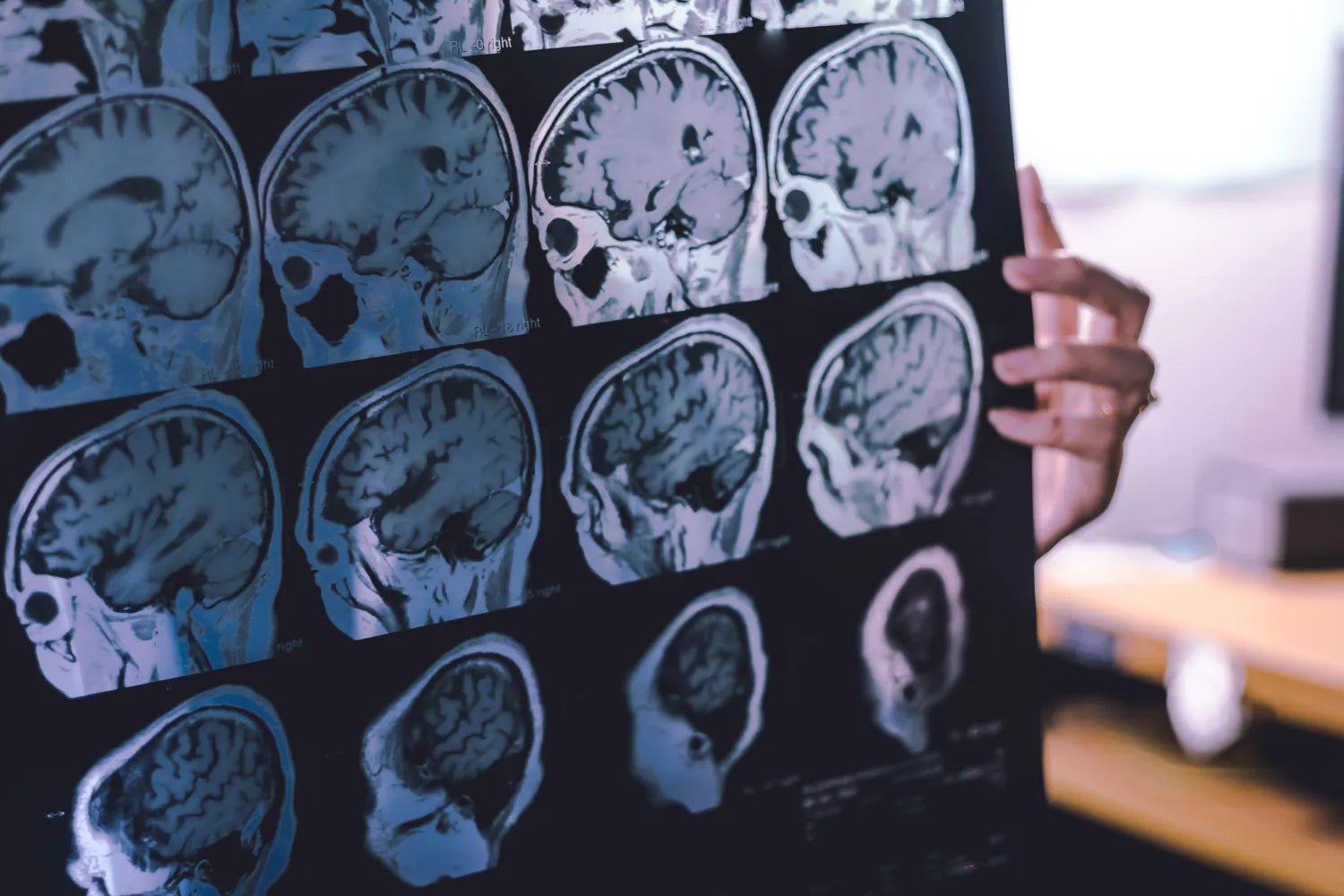
Dr. Eric Venn-Watson’s Highlights
-
- Cognitive decline is a normal part of aging, but dementia is not.
- Dementia is an umbrella term for a group of cognitive illnesses that change the way a person thinks, remembers, and behaves.
- Supporting cognitive health with lifestyle changes and smart supplements can help you reduce your risk of age-related mental decline and help protect against dementia.
Anyone older than 40 can tell you that losing your keys or forgetting a name is a weekly event. Some days, it is even challenging to remember why you walked into a certain room. These types of mental hiccups, though frustrating, are usually normal and no cause for alarm. Although they may annoy you, they are not the same thing as dementia.
Dementia isn’t an inevitable part of growing older, although some level of cognitive decline is. Dementia is a group of serious conditions that seriously impact the way a person can recall information, learn, focus, and behave. At some point, a person with dementia will likely have trouble working and taking care of themselves.
Let’s review what “normal” cognitive aging looks like and how it differs from dementia. We’ll also cover what you can do to protect your cognitive health and reduce your risk of losing your mental sharpness.
Normal Age-Related Cognitive Changes
Your brain is like a super-powerful computer, and like computers, it changes over time. As you age, you may notice changes like:
-
Slower processing speed. Performing mental math, doing a crossword puzzle, or simply telling a story may take longer than it used to.
-
Occasional forgetfulness. Losing your keys, forgetting appointments, and not being able to immediately remember someone’s name may happen from time to time, but not so frequently that it interferes with your daily life.
- Trouble multitasking. If you were once skilled at doing two things at once, you may find yourself frustrated when you attempt to multitask as you age. It just becomes harder.
These changes are noticeable, but they don’t interfere too much with your day-to-day life.
Understanding Dementia
Dementia is an umbrella term for over 100+ illnesses that affect a person’s cognitive abilities. Dementia is caused by damage to brain cells, and it is not a “normal” part of aging, though it is most common in the elderly population.
Dementia includes diseases like:
- Alzehiemer’s disease
- Vascular dementia
- Lewy body dementia
- Frontotemporal lobe dementia
- Mixed dementia
People who have one form of dementia are more likely to develop a secondary type of dementia. Alzheimer’s is the most common form of dementia, followed by vascular dementia. Unlike normal aging, dementia gets worse over time and ultimately impacts a person’s ability to take care of themselves.
Differences Between Normal Cognitive Decline and Dementia
Noticing a change in your cognitive function can be alarming. It’s helpful to understand the differences between normal cognitive decline and early signs of dementia.
Normal Cognitive Decline
Symptoms of normal, age-related cognitive decline can include:
- Occasionally forgetting names
- Losing items but finding them again
- Forgetting what day it is
- Difficulty finding your words
- Changes in mood due to life events
Normal cognitive decline can be a nuisance, but it does not interfere with a person’s ability to work, enjoy social activities, and care for themselves. The symptoms of dementia are more significant and happen on a more frequent basis.
Early Signs of Dementia
The earliest signs of dementia may look similar to cognitive decline, but they are usually intensified.
They can include:
- Forgetting someone’s name whom you know personally, and not being able to recall it
- Placing items in bizarre places (like your keys in the fridge) and having no memory of it
- Being disoriented about your location, even if you are in a familiar area
- Trouble holding a conversation or understanding your native language
- Noticeable changes in personality that don’t correlate with a life event
The bottom line? Mild cognitive changes are manageable, but symptoms of dementia are intense, happen frequently, and interfere with a person’s ability to live their life.
Symptoms of Dementia
A healthcare practitioner relies on tests, interviews, and evaluations to determine if a person has dementia. Usually, a person who has dementia may not realize it. People with dementia may initially realize they have it, but forget they have it as their disease progresses.
Symptoms of dementia include:
-
Memory loss that disrupts daily life. This includes forgetting recent events, repeating questions or conversations, or needing an increased amount of reminders.
-
Problems with language. This includes forgetting words, not being able to hold a conversation, and not understanding when others speak.
-
Difficulty with familiar tasks. This includes the ability to care for oneself, drive, cook, or follow simple instructions.
-
Mood and personality changes. Irritability, suspicion, depression, and withdrawal can be common in dementia patients.
-
Confusion about time and place. Getting lost in familiar areas, thinking that the current year is different, and not recognizing your own home can be symptoms of dementia-related confusion.
- Poor judgment. People with dementia may make unwise financial decisions, trust strangers in risky situations, or act out of character.
Symptoms of dementia get progressively worse, never better. The clearest evidence that you are suffering from something more than age-related cognitive decline is that it interferes with your daily life.
Who Will Get Dementia?
There’s no definitive way to tell if you will or will not develop dementia. Several tests are available that screen for genetic markers that may indicate a person is more likely to develop it. Even if you are genetically predisposed to dementia, there’s still no guarantee you will or will not develop it.
Dementia primarily affects people over the age of 65, although early-onset dementia can affect people as young as 40. About 57 million people globally have some form of dementia.
Risk factors for dementia include:
- Age
- Family history of dementia
- Cardiovascular disease
- Head injuries
- Hearing loss
- Diabetes
- Smoking
- Excessive alcohol use
It’s important to remember that age increases your risk of dementia, but it does not mean that dementia is inevitable.
Causes of Dementia
Dementia is caused by damage to healthy brain cells. Damage to these cells can happen for several reasons.
- Head injury or trauma
- Chronic alcohol abuse
- Infections
- Neurodegenerative diseases
- Vascular damage
Although there is no cure for dementia, treatment can help slow its progression, especially if it is detected early.
Protecting Your Cognitive Health
You can’t change your genetic makeup, but you have a lot more control over how your brain ages than you may realize. Protecting your cognitive health isn’t difficult; it just requires some intentional lifestyle adjustments and the help of a simple, yet powerful, fatty acid supplement.
Manage Your Health
Eating a balanced diet and getting regular exercise are important, but managing your health also involves managing chronic conditions. If you have high blood pressure or diabetes, make sure you are receiving effective treatment to reduce your risk of complications.
Yearly blood tests can also check for illness and catch diseases early. Keeping your body healthy is one of the best ways to keep your brain healthy.
Stay Socially Engaged
Developing friendships and staying socially connected play a role in preventing and managing dementia. Conversations, games, and cognitive stimulation help protect brain cells and provide an outlet for emotional support. Staying socially active can be difficult with age, but investing in this aspect of one’s life can impact brain health in a positive way.
Try a Supplement
If you’d like to support your brain function as you age, try a brain-supporting supplement. A simple fatty acid, known as C15:0, has been shown to provide neuroprotective benefits in mammals.
Researchers studying longevity in bottlenose dolphins discovered that populations of dolphins with more C15:0 circulating in their bodies had fewer occurrences of age-related illness. They also found that dolphins develop the same changes in their brains as humans with Alzheimer’s do.
Dolphins with higher levels of C15:0 have less FAAH and MAO-B in their brains. These two enzymes are directly associated with markers for Alzheimer's, suggesting the mechanism by which C15:0 offers neuroprotection.
There’s just one small problem: this powerful fatty acid is only found in trace amounts in some fish (the dolphins’ diet) and full-fat dairy (like whole milk). Getting C15:0 from your diet could be difficult, which is why a supplement makes sense.
Fatty15: The C15:0 Supplement
Unless you’d like to clock an additional 150 calories per cup of whole milk each day (and consume additional sugars from lactose), a supplement is a good choice for getting the benefits of C15:0 without excess calories or the excess ‘bad’ saturated fats.
Fatty15 is the first and only supplement that contains the pure, vegan-friendly version of C15:0, which contains just one calorie per dose. In addition to neuroprotection, you’ll get benefits that protect and restore every cell in your body, like:
- Stronger cell membranes
- Improved mitochondrial function
- Removal and clean up of damaged cells
- Lower occurrence of proinflammatory cytokines
Higher levels of C15:0 have been consistently associated with lower LDL cholesterol and improved liver enzymes. Adding just one fatty15 supplement per day to your health plan can also support your cognitive and cellular health and give you the ability to support your chances of living a long, healthy life.
How Does C15:0 Affect Cognitive Health?
A recent Office of Naval Research-funded study explored fatty15’s potential to directly benefit brain health using an independently run, third-party panel that screened for neuroprotective molecules.
As shared in the International Journal of Molecular Sciences, C15:0 had two dose-dependent activities that support cognitive health:
FAAH
Fatty15 inhibits fatty acid amide hydrolase (FAAH). To better understand what this means, let's start with endocannabinoids. Endocannabinoids are “happy” molecules made by our bodies that naturally balance healthy immune responses in our brain and support our cognitive health.
Unfortunately, as we get older, an enzyme called FAAH rapidly breaks down endocannabinoids, resulting in age-related declines in cognitive function. By inhibiting FAAH, however, fatty15 can support healthy levels of our oh-so-wonderful happy molecules, not just to protect our brain health, but also to support healthy sleep, better joint comfort, and calmer moods. Yes, please.
MAO-B
Fatty15 inhibits monoamine oxidase B (MAO-B). To better understand what this means, let's start with dopamine. Dopamine is a key messenger in our brain that supports healthy memory and mood, resulting in improved cognitive function. As we get older, however, an enzyme called MAO-B increasingly breaks down dopamine.
Here’s the good news: by inhibiting MAO-B, fatty15 can help to maintain healthy dopamine levels in the brain, which, in addition to protecting brain health, can also support calm moods and better sleep. Further, as described by Knoll and Ruehl et al., MAO-B inhibitors have also been shown to extend the lifespan of both rats and dogs.
Due to the many anti-aging benefits of MAO-B inhibitors (aka fatty15), these molecules have been proposed as a means to slow biological aging and protect against age-related cognitive decline. Well, that’s pretty exciting.
These newly discovered activities of fatty15 are consistent with prior human studies showing that people with higher C15:0 levels have better overall cognitive performance scores, including better memory and better mood.
FAQs
Is dementia normal with age?
No. Dementia is more common with age, but it is not a normal part of aging. Dementia includes the loss of cognitive function over time. People with dementia lose the ability to think, recall information, learn new skills, and reason properly. They may also have changes in behavior.
What is the number one trigger for dementia?
The biggest risk factor for dementia is age. A person’s risk increases as they get older, especially after age 65. The probability of developing dementia rises with each year of a person’s life. The risk doubles every five years after age 65.
How to detect early dementia?
Early detection of dementia is important for treatments that may slow its progression. Symptoms are better managed with early protection. Memory problems, difficulty with familiar tasks, and mood and personality changes can be symptoms of early-stage dementia. Cognitive and neurological tests (along with brain scans) can be effective in diagnosing dementia.
Your Brain’s Best Future
Dementia is not a normal part of aging, but some mild cognitive decline is. Knowing the difference between a “senior moment” and a legitimate sign of dementia can mean detecting it early and getting the treatment you need to slow its progression.
Your brain is your most valuable asset. Treat it well and you can increase your chances of maintaining mental sharpness for years to come. Add in once-per-day fatty15, and you’re setting yourself up for cognitive success and a vibrant mind throughout your golden years.
Sources:
Dementia | World Health Organization
Dementia - Symptoms and causes | Mayo Clinic
Social participation and risk of developing dementia | Nature Aging

Eric Venn-Watson M.D.
CEO, Co-Founder
Senior Scientist, Co-Founder
Eric is a physician, U.S. Navy veteran, and Co-founder and COO of Seraphina Therapeutics. Eric served over 25 years as a Navy and Marine Corps physician, working with the special forces community to improve their health and fitness. Seraphina Therapeutics is a health and wellness company dedicated to advancing global health through the discovery of essential fatty acids and micronutrient therapeutics.
You May Also Like...
The Definitive Guide to Aging's Role in Human Longevity
Aging is a complex biological process impacting health and longevity, requiring a distinction between chronological age, biological age, and psychological age to understand its nuances
7 Proven Ingredients That Boost Anti‑Aging Benefits Naturally
The quest for healthy aging has evolved into evidence-based science, identifying specific nutrients that support cellular health and longevity.


